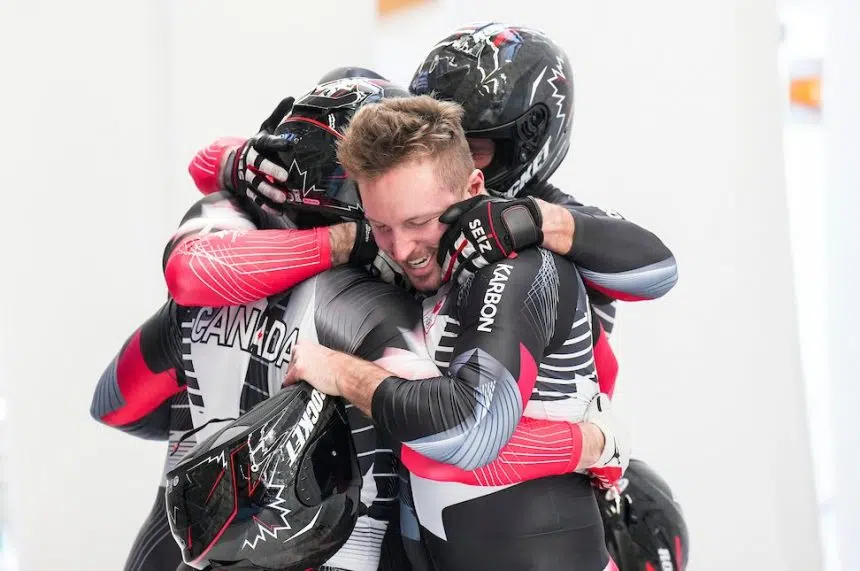Ben Coakwell and his teammates kept their heads down in Beijing — and that helped them win a bronze medal.
Coakwell, a 34-year-old product of Moose Jaw, was the brakeman in the Canadian sled that finished third in the four-man bobsleigh during the Winter Olympics.
The medal was the first for Coakwell in three Olympic appearances, but he didn’t know he was winning it while as his sled hurtled down the track.
“Bobsled is such a strange sport in that you don’t know how fast you’re going when it’s happening,” Coakwell told The Green Zone’s Jamie Nye on Friday. “Even Justin (Kripps, Coakwell’s driver) doesn’t know.
“I have to brake the sled at the end of the run and (usually) I just listen for the cheers. It felt like forever this time. I was just waiting for it and waiting for it and then I heard it and I was like, ‘All right! Let’s go!!’ ”
Kripps, Coakwell, Ryan Sommer and Cam Stones were third after each of the first, second and third runs. Entering the fourth and final run, they were just 0.08 seconds ahead of Germany’s Christoph Hafer.
Driving right before Kripps, Hafer posted a time of 59.25 seconds in his last run. The clock showed Kripps was losing time to the German sled in his final run, but he somehow made up ground in the final few turns and edged Hafer for third by 0.06 seconds.
“I wish people understood (that) once you start losing time in a bobsleigh run, usually you don’t get that time back,” Coakwell said. “Usually it bleeds and bleeds and bleeds until you go negative. That’s how it goes 99 per cent of the time.
“Where those few hundredths came from (in Beijing), I’ll never know. It’s just nuts to me.”
Coakwell attributed the crew’s success to the familiarity the four men have with each other and the rhythm they’ve developed since becoming teammates four years ago.
They’ve also become quite familiar with knowing what it takes to get from the start to the finish as fast as they can.
“It’s a very volatile thing to go down the track; it’s loud and it’s very rough,” Coakwell said. “There’s no suspension system in these things. I can’t really explain or get the point across of just how ridiculous it is, but you have to find some peace in that process.
“It’s a minute of pushing as hard as you can and then centring your breathing and lowering your heart rate again so you can sit low and ride smooth and loose so that all the vibration in the track goes through you. I find that’s the best way to be fast down the track — at least for us.”
Coakwell ran track at the University of Saskatchewan, so he knows about searching for speed. He also was a running back with the Huskies football team, and the gridiron is becoming a training ground for the Canadian bobsleigh team.
The squad in Beijing featured former football players like Coakwell and Sam Giguere as well as current CFLer Jay Dearborn. Previous teams have included ex-football players like Jesse Lumsden and Lyndon Rush.
“You need the body weight but you need to be fast,” Coakwell said when asked why football players can be good bobsledders. “It’s one of those things where the transition is easy if you have that.
“The other thing is, football requires heart to be good at it. You can take a team that’s less talented and if you can pull out that heart, then they’re going to be successful. I think bobsleigh’s the same way.
“You’re pushing a heavy object in front of you and there are some intangibles there that you can’t really measure that some people just tend to have. It seems like football players can tap into that.”
Kripps currently is Canada’s leading driver, but he used to be a brakeman. Could a similar move be in Coakwell’s future?
“I have no interest in that,” he said with a chuckle. “I would say that being a driver is equivalent to being a QB. There’s just a lot of extra work you’ve got to do.
“I just want to train and push and be an animal in that regard.”











